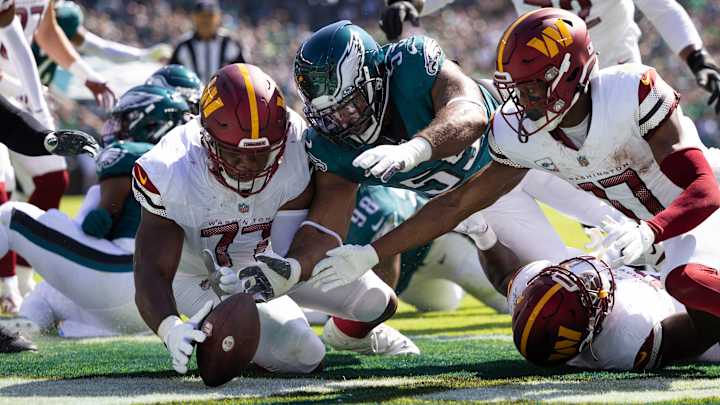NFL Must Protect the Penalty for Fumbling Out of the End Zone

As if offenses didn’t already have a special place in the NFL rulebook’s heart, the league’s vice president of football operations, Troy Vincent, told reporters Wednesday that the shadowy powers are “looking into” the fumble-out-of-the-end-zone-touchback rule.
You are probably already familiar but for those still catching up: If a player fumbles the ball in play, and that ball crosses the plane of the opponent’s end zone and goes out of bounds, the result is a change in possession. The defense gets the ball. The offense cries about a rule that is perfectly reasonable in its construct but has been demonized amid the league’s push to completely remove any barriers from you and a totally satiated Sunday of absurdly high fantasy scores.
Here are multiple examples of the play in case you would like further clarification.
I have never understood the outrage over this rule. Opponents say that the defense is not earning a possession because they aren’t recovering anything. They are simply benefiting from the fact that someone was reckless with the ball around the end zone. To that I say: fantastic.
Offenses currently benefit from defensive players breathing on wide receivers, defensive linemen and edge rushers falling anywhere near a quarterback in an attempt to sack them, defensive linemen and edge rushers even mentally considering the idea of sacking a quarterback, or defensive linemen and edge rushers looking moderately menacing when they cross paths with a quarterback who is famous enough to be recognized with his helmet off (sorry, Nick Mullens, not yet).
Offensive players benefit from being able to false start legally on every play. They benefit from multitudes of uncalled holding penalties and illegal hands to the face penalties (Myles Garrett compared his body after a game to the victim of a feral cat attack!). They benefit from a myriad of legal pick plays that are run at such a high speed that it’s almost impossible to determine whether it’s actually a legal pick.
Offensive players get treated with the delicacy of toddlers at their first ice skating lessons. Defensive players get treated like American figure skaters competing in front of Russian judges, penalized merely for not blinking enough (or blinking too much!).
Beyond leveling the playing field just a bit, abandoning the rule would also diminish the sacredness of the end zone. Another fun argument from opponents to the rule is that nothing would happen if an offensive player fumbled the ball and it trickled out of bounds just before the pylon, so why does it trigger a touchback and a change of possession if you fumble the ball just after the pylon?
Well, because if you go out of bounds just before the pylon, you did not earn a touchdown. If you cross the pylon, you earn a touchdown.
I am full-throated in my support of those who have argued the importance of the red zone as a kind of sacrosanct area of the football field. I think it should be legislated more carefully by officials and we should uphold the idea that scoring is difficult and should be the result of near perfection. Scoring a touchdown should require proper play design, elite strength, speed, blocking and skill. Along with that, it should require that players exhibit proper ball security.
If a skydiving instructor fails to secure the parachute in your pouch, he doesn’t get to rewind time and rectify the mistake. If you finally meet someone you have been secretly in love with and instead of dropping a perfect pickup line you scream ad copy from the Williams Sonoma catalog, that person (likely) won’t stick around until you compose yourself. If you send the Love and Romance flowers package to a funeral instead of a sympathy bouquet, the funeral director isn’t going to drive it back to your house, pat you on the head and say: Why don’t we try this again?
So, why should you get a touchdown for flying across the goal line without the ball in a secure location? Or, why should you even be protected by the rulebook and allowed to maintain possession, getting another crack at it?
That’s the other part of “looking into” this rule that bothers me. What would happen for the offense if this rule were to be overturned? Would they get the ball back at the point at which the player fumbled? Would they get the ball at the 1-yard line? Would they simply maintain possession from wherever the ball was snapped and lose the down?
Either way, it’s all coddling. It’s a ridiculous kowtow to one side of the ball that already has the game in the palm of its hands (and, hilariously, can barely overcome a 30-point over/under this season). If you mess up in the red zone, it’s a big deal and there shouldn’t be some kind of safety valve. In life, there are, unfortunately, moments that we cannot have back. The red zone is a perfect metaphor for those moments amid a football game. It should be perfect.

Conor Orr is a senior writer for Sports Illustrated, where he covers the NFL and cohosts the MMQB Podcast. Orr has been covering the NFL for more than a decade and is a member of the Pro Football Writers of America. His work has been published in The Best American Sports Writing book series and he previously worked for The Newark Star-Ledger and NFL Media. Orr is an avid runner and youth sports coach who lives in New Jersey with his wife, two children and a loving terrier named Ernie.
Follow ConorOrr